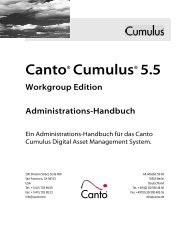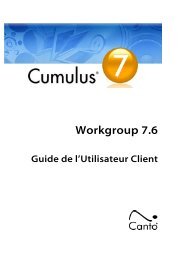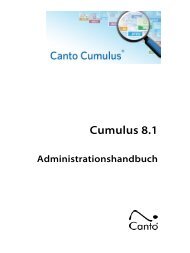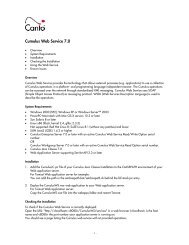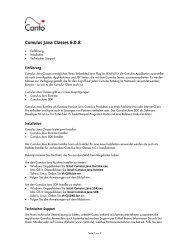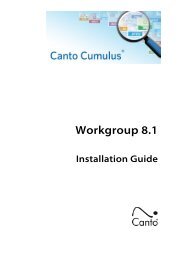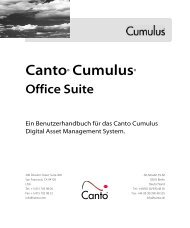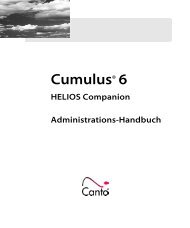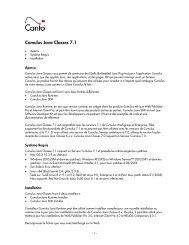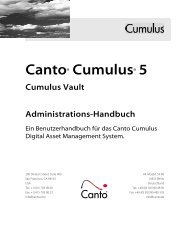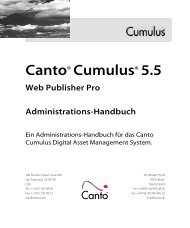- Page 1 and 2: Cumulus 8.1Client User Guide
- Page 4 and 5: 4 CUMULUS® - CLIENT USER GUIDEMail
- Page 6 and 7: 6 CUMULUS® - CLIENT USER GUIDEOpti
- Page 8 and 9: 8 CUMULUS® - CLIENT USER GUIDECumu
- Page 10 and 11: 10 CUMULUS® - CLIENT USER GUIDEThi
- Page 12 and 13: 12 CUMULUS® - CLIENT USER GUIDEAn
- Page 14 and 15: 14 CUMULUS® - CLIENT USER GUIDE
- Page 16 and 17: 16 CUMULUS® - CLIENT USER GUIDEOve
- Page 20 and 21: 20 CUMULUS® - CLIENT USER GUIDEint
- Page 22 and 23: 22 CUMULUS® - CLIENT USER GUIDEAs
- Page 24 and 25: 24 CUMULUS® - CLIENT USER GUIDETIP
- Page 26 and 27: 26 CUMULUS® - CLIENT USER GUIDEwhe
- Page 28 and 29: 28 CUMULUS® - CLIENT USER GUIDETo
- Page 30 and 31: 30 CUMULUS® - CLIENT USER GUIDE•
- Page 32 and 33: 32 CUMULUS® - CLIENT USER GUIDETo
- Page 34 and 35: 34 CUMULUS® - CLIENT USER GUIDE1.
- Page 36 and 37: 36 CUMULUS® - CLIENT USER GUIDESet
- Page 38 and 39: 38 CUMULUS® - CLIENT USER GUIDEYou
- Page 40 and 41: 40 CUMULUS® - CLIENT USER GUIDEpri
- Page 42 and 43: 42 CUMULUS® - CLIENT USER GUIDESea
- Page 44 and 45: 44 CUMULUS® - CLIENT USER GUIDEBAC
- Page 46 and 47: 46 CUMULUS® - CLIENT USER GUIDEIn
- Page 48 and 49: 48 CUMULUS® - CLIENT USER GUIDEIn
- Page 50 and 51: 50 CUMULUS® - CLIENT USER GUIDETo
- Page 52 and 53: 52 CUMULUS® - CLIENT USER GUIDEcho
- Page 54 and 55: 54 CUMULUS® - CLIENT USER GUIDEYou
- Page 56 and 57: 56 CUMULUS® - CLIENT USER GUIDETo
- Page 58 and 59: 58 CUMULUS® - CLIENT USER GUIDEFie
- Page 60 and 61: 60 CUMULUS® - CLIENT USER GUIDETim
- Page 62 and 63: 62 CUMULUS® - CLIENT USER GUIDECat
- Page 64 and 65: 64 CUMULUS® - CLIENT USER GUIDEDra
- Page 66 and 67: 66 CUMULUS® - CLIENT USER GUIDEOve
- Page 68 and 69:
68 CUMULUS® - CLIENT USER GUIDEbas
- Page 70 and 71:
70 CUMULUS® - CLIENT USER GUIDEEdi
- Page 72 and 73:
72 CUMULUS® - CLIENT USER GUIDECTR
- Page 74 and 75:
74 CUMULUS® - CLIENT USER GUIDEFul
- Page 76 and 77:
76 CUMULUS® - CLIENT USER GUIDEeac
- Page 78 and 79:
78 CUMULUS® - CLIENT USER GUIDEon
- Page 80 and 81:
80 CUMULUS® - CLIENT USER GUIDE•
- Page 82 and 83:
82 CUMULUS® - CLIENT USER GUIDE•
- Page 84 and 85:
84 CUMULUS® - CLIENT USER GUIDEup
- Page 86 and 87:
86 CUMULUS® - CLIENT USER GUIDEnew
- Page 88 and 89:
88 CUMULUS® - CLIENT USER GUIDEMas
- Page 90 and 91:
90 CUMULUS® - CLIENT USER GUIDEThe
- Page 92 and 93:
92 CUMULUS® - CLIENT USER GUIDEmay
- Page 94 and 95:
94 CUMULUS® - CLIENT USER GUIDEUsi
- Page 96 and 97:
96 CUMULUS® - CLIENT USER GUIDE•
- Page 98 and 99:
98 CUMULUS® - CLIENT USER GUIDEOve
- Page 100 and 101:
100 CUMULUS® - CLIENT USER GUIDECh
- Page 102 and 103:
102 CUMULUS® - CLIENT USER GUIDE2.
- Page 104 and 105:
104 CUMULUS® - CLIENT USER GUIDE3.
- Page 106 and 107:
106 CUMULUS® - CLIENT USER GUIDE6.
- Page 108 and 109:
108 CUMULUS® - CLIENT USER GUIDE2.
- Page 110 and 111:
110 CUMULUS® - CLIENT USER GUIDESe
- Page 112 and 113:
112 CUMULUS® - CLIENT USER GUIDEDi
- Page 114 and 115:
114 CUMULUS® - CLIENT USER GUIDEwo
- Page 116 and 117:
116 CUMULUS® - CLIENT USER GUIDEWo
- Page 118 and 119:
118 CUMULUS® - CLIENT USER GUIDE4.
- Page 120 and 121:
120 CUMULUS® - CLIENT USER GUIDE3.
- Page 122 and 123:
122 CUMULUS® - CLIENT USER GUIDECl
- Page 124 and 125:
124 CUMULUS® - CLIENT USER GUIDE1.
- Page 126 and 127:
126 CUMULUS® - CLIENT USER GUIDETh
- Page 128 and 129:
128 CUMULUS® - CLIENT USER GUIDERE
- Page 130 and 131:
130 CUMULUS® - CLIENT USER GUIDEAs
- Page 132 and 133:
132 CUMULUS® - CLIENT USER GUIDEDe
- Page 134 and 135:
134 CUMULUS® - CLIENT USER GUIDE
- Page 136 and 137:
136 CUMULUS® - CLIENT USER GUIDEUs
- Page 138 and 139:
138 CUMULUS® - CLIENT USER GUIDECa
- Page 140 and 141:
140 CUMULUS® - CLIENT USER GUIDETh
- Page 142 and 143:
142 CUMULUS® - CLIENT USER GUIDE2.
- Page 144 and 145:
144 CUMULUS® - CLIENT USER GUIDEIf
- Page 146 and 147:
146 CUMULUS® - CLIENT USER GUIDEVi
- Page 148 and 149:
148 CUMULUS® - CLIENT USER GUIDENO
- Page 150 and 151:
150 CUMULUS® - CLIENT USER GUIDE2.
- Page 152 and 153:
152 CUMULUS® - CLIENT USER GUIDE8.
- Page 154 and 155:
154 CUMULUS® - CLIENT USER GUIDEim
- Page 156 and 157:
156 CUMULUS® - CLIENT USER GUIDE(e
- Page 158 and 159:
158 CUMULUS® - CLIENT USER GUIDE.O
- Page 160 and 161:
160 CUMULUS® - CLIENT USER GUIDEap
- Page 162 and 163:
162 CUMULUS® - CLIENT USER GUIDEsp
- Page 164 and 165:
164 CUMULUS® - CLIENT USER GUIDECo
- Page 166 and 167:
166 CUMULUS® - CLIENT USER GUIDENO
- Page 168 and 169:
168 CUMULUS® - CLIENT USER GUIDEBu
- Page 170 and 171:
170 CUMULUS® - CLIENT USER GUIDEWo
- Page 172 and 173:
172 CUMULUS® - CLIENT USER GUIDETh
- Page 174 and 175:
174 CUMULUS® - CLIENT USER GUIDE
- Page 176 and 177:
176 CUMULUS® - CLIENT USER GUIDEth
- Page 178 and 179:
178 CUMULUS® - CLIENT USER GUIDEan
- Page 180 and 181:
180 CUMULUS® - CLIENT USER GUIDE
- Page 182 and 183:
182 CUMULUS® - CLIENT USER GUIDEPr
- Page 184 and 185:
184 CUMULUS® - CLIENT USER GUIDEOv
- Page 186 and 187:
186 CUMULUS® - CLIENT USER GUIDERe
- Page 188 and 189:
188 CUMULUS® - CLIENT USER GUIDETI
- Page 190 and 191:
190 CUMULUS® - CLIENT USER GUIDEYo
- Page 192 and 193:
192 CUMULUS® - CLIENT USER GUIDECa
- Page 194 and 195:
194 CUMULUS® - CLIENT USER GUIDEon
- Page 196 and 197:
196 CUMULUS® - CLIENT USER GUIDEOv
- Page 198 and 199:
198 CUMULUS® - CLIENT USER GUIDETh
- Page 200 and 201:
200 CUMULUS® - CLIENT USER GUIDEBe
- Page 202 and 203:
202 CUMULUS® - CLIENT USER GUIDEim
- Page 204 and 205:
204 CUMULUS® - CLIENT USER GUIDEwi
- Page 206 and 207:
206 CUMULUS® - CLIENT USER GUIDEOP
- Page 208 and 209:
208 CUMULUS® - CLIENT USER GUIDEas
- Page 210 and 211:
210 CUMULUS® - CLIENT USER GUIDEda
- Page 212 and 213:
212 CUMULUS® - CLIENT USER GUIDE5.
- Page 214 and 215:
214 CUMULUS® - CLIENT USER GUIDEin
- Page 216 and 217:
216 CUMULUS® - CLIENT USER GUIDEOv
- Page 218 and 219:
218 CUMULUS® - CLIENT USER GUIDEEd
- Page 220 and 221:
220 CUMULUS® - CLIENT USER GUIDEWh
- Page 222 and 223:
222 CUMULUS® - CLIENT USER GUIDEOv
- Page 224 and 225:
224 CUMULUS® - CLIENT USER GUIDEPD
- Page 226 and 227:
226 CUMULUS® - CLIENT USER GUIDEWe
- Page 228 and 229:
228 CUMULUS® - CLIENT USER GUIDE2.
- Page 230 and 231:
230 CUMULUS® - CLIENT USER GUIDEA
- Page 232 and 233:
232 CUMULUS® - CLIENT USER GUIDEOv
- Page 234 and 235:
234 CUMULUS® - CLIENT USER GUIDETh
- Page 236 and 237:
236 CUMULUS® - CLIENT USER GUIDEon
- Page 238 and 239:
238 CUMULUS® - CLIENT USER GUIDE8.
- Page 240 and 241:
240 CUMULUS® - CLIENT USER GUIDEth
- Page 242 and 243:
242 CUMULUS® - CLIENT USER GUIDEon
- Page 244 and 245:
244 CUMULUS® - CLIENT USER GUIDEPr
- Page 246 and 247:
246 CUMULUS® - CLIENT USER GUIDEBa
- Page 248 and 249:
248 CUMULUS® - CLIENT USER GUIDEIn
- Page 250 and 251:
250 CUMULUS® - CLIENT USER GUIDECo
- Page 252 and 253:
252 CUMULUS® - CLIENT USER GUIDEPr
- Page 254 and 255:
254 CUMULUS® - CLIENT USER GUIDEPr
- Page 256 and 257:
256 CUMULUS® - CLIENT USER GUIDECo
- Page 258 and 259:
258 CUMULUS® - CLIENT USER GUIDEAs
- Page 260 and 261:
260 CUMULUS® - CLIENT USER GUIDEAs
- Page 262 and 263:
262 CUMULUS® - CLIENT USER GUIDETh
- Page 264 and 265:
264 CUMULUS® - CLIENT USER GUIDEIm
- Page 266 and 267:
266 CUMULUS® - CLIENT USER GUIDECo
- Page 268 and 269:
268 CUMULUS® - CLIENT USER GUIDETh
- Page 270 and 271:
270 CUMULUS® - CLIENT USER GUIDECh
- Page 272 and 273:
272 CUMULUS® - CLIENT USER GUIDEWi
- Page 274 and 275:
274 CUMULUS® - CLIENT USER GUIDESh
- Page 276 and 277:
276 CUMULUS®ActionFunction or comb
- Page 278 and 279:
278 CUMULUS®Context menuAlso calle
- Page 280 and 281:
280 CUMULUS®FiltersSoftware utilit
- Page 282 and 283:
282 CUMULUS®RecordThe actual catal
- Page 284 and 285:
284 CUMULUS®
- Page 286 and 287:
286 CUMULUS® - CLIENT USER GUIDEAs
- Page 288 and 289:
288 CUMULUS® - CLIENT USER GUIDECo
- Page 290 and 291:
290 CUMULUS® - CLIENT USER GUIDEIo
- Page 292 and 293:
292 CUMULUS® - CLIENT USER GUIDEPa
- Page 294 and 295:
294 CUMULUS® - CLIENT USER GUIDERe
- Page 296:
296 CUMULUS® - CLIENT USER GUIDEVa



